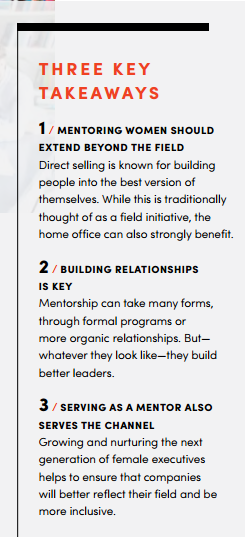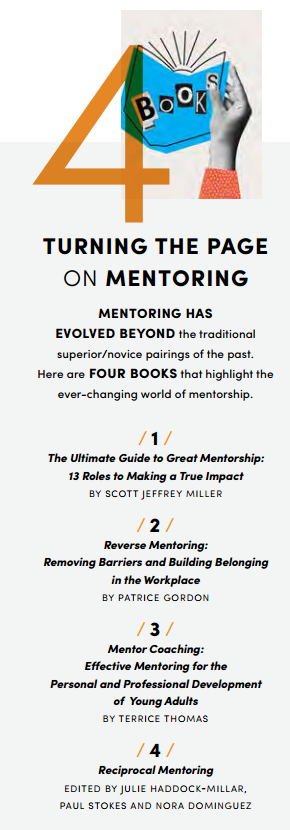What Women in Direct Selling Really Want
Modern culture does a great deal of shouting about what and who to emulate—creating carefully curated online personas, it feeds a steady stream of so-called “role models” targeting people of all ages. “Admire me, envy me, be me,” they say. Young girls and women are a favorite demographic for these campaigns. And if they’re lucky, these females choose good role models, whose influence is positive in their lives.
But heavily marketed role models don’t really serve the long term. Women and girls eventually need more than the social media influencer, athlete, singer or movie star can provide. And as they outgrow their role models, they seek deeper connections with people who are living the journey they want to take in their own careers and personal lives.

Just like their male counterparts, women want guidance, support and accountability from someone who understands and someone they can trust to help them meet their goals. Mentors—that’s what women really want.
Like generations of men whose mentors opened doors to career advancement, women want and deserve to experience mentorship’s transformational power in their lives, too.
Transformational Mentorship Equals Success
Much of the direct selling industry’s success since inception can be credited to the transformational power of mentorship in the field. Relationships between uplines and downlines of field organizations make it possible for new representatives to gain the knowledge of those who have walked the path before them and succeeded. Product demos, prospecting advice, pep talks and training—effective mentorship is a duplicatable key to building field leaders and successful field organizations.
“What I love most about the direct sales space is it is built upon the premise of mentorship. Women from varying backgrounds, geographic locations and skill sets can learn from each other to advance toward a common goal. Almost every compensation plan rewards the very act of helping someone else achieve what they want. In traditional business it is all about competition, where in our model it’s all about collaboration. This creates a unique environment that allows women to thrive,” Amber Olson Rourke, Co-Founder and Chief Sales and Marketing Officer, Neora, said.

But what about women who choose to work in corporate direct selling roles? Are they thriving? Are they growing? Are their voices heard? Are they decision-makers? Are they finding the mentors they need to make all those things possible?
“One day in 2014, I was in my office at Avon Products in New York,” Melissa Thompson, Founder and CEO of BELLAME, said. “I laughed when I read our branding…’The Company for Women,’ a line that once inspired me during the era of Andrea Jung, now amused me—the irony of it all. The Company for Women. Designed by Men. While I greatly respected my male colleagues, there was something fundamentally off when the decision-making boardrooms hardly mirrored the reality of our field—where most of our leaders, those driving our business forward, were women.”
In corporate America, men in senior leadership roles outnumber women by a 2:1 margin, according to the “Women in the Workplace Study” by McKinsey & Company. A quick glance at today’s direct selling corporate board rosters indicates Thompson’s impressions at Avon in 2014 are still being played out industry wide in companies large and small, a full decade later.
To fulfill the promise of empowerment that direct selling companies so readily extend to their female-led fields, Thompson believes companies need to position women in corporate leadership roles, too.

Representation in the boardroom is the surest way for women to see themselves aspiring to the direct selling corporate arena, whether they already work in the industry or not. And championing corporate mentorship is the way to open those doors to capable and driven females and others to expand diversity of thought, experience and expertise for the benefit of the larger industry.
Ashlee Headlee, Awakend’s Co-Founder and Chief Program Officer, shared, “I believe the first step corporate leadership can take to foster stronger female-to-female mentorship is committing to building a culture that values and supports the professional and personal growth of women. Intentions matter. If pure intentions regarding the development of women in the workplace are set, a beautiful, multi-faceted strategy will undoubtedly blossom. A strategy where mentorship programs, female-to-female mentorships, recognition programs, networking opportunities, and so much more can thrive.”
And according to recent research by MentorcliQ, advancing a mentorship culture and associated programs is good for business. When Fortune 500 companies were hit hard economically in 2020, talent development programs and mentoring programs eased the pain. Companies with mentoring programs (not exclusively female-focused) had profits 18 percent better than average, while those without mentoring programs had profits that were 45 percent worse than average.
Companies that also had female CEOs doubly benefited, according to Forbes reporting on the study in May 2022. “Fortune 500 companies that have both mentoring programs and female CEOs emerged from the economic ravages of 2020 with an average year-over-year profit change that was positive instead of negative. So, while other companies, even those with mentoring, saw negative numbers for their year-over-year profit changes, the 41 companies with female CEOs (90 percent of which have mentoring programs), on average, enjoyed a growth in profits or a significantly more muted downward turn.”
Women Mentoring Women
Historically, mentoring relationships have been tricky for females working in predominately male workplaces. Men tend to mentor men and with fewer women occupying roles in the C-Suite, female pairings could be scarce. Of course, gender doesn’t dictate mentor pairings nor predict their value or success, but gender dynamics in the post “me too” era may contribute a tenuous characteristic to some male/female mentoring relationships.

The vast majority of Red Aspen Co-Founder and CEO Jesse McKinney’s mentors have been male and their relationships impactful; however, she thinks a female mentor can speak to different things. “Having solidarity with someone who listens and understands adds another layer of dimension to mentorship. One form of mentorship isn’t better than the other, male-to-female or female-to-female, rather they are unique and valuable in their own ways.”
Executives throughout the industry echoed her thoughts. As Aspen Emry, Co-Founder and CEO of Bravenly Global shared, “Mentorship in general is so powerful, but there is something inherently special about female mentorship. As we go through similar struggles—both external struggles in corporate America, but also many of the internal struggles that can run deep. Women often struggle with ‘mom guilt.’ We are pulled in many different directions and want to believe that we can have it all. We don’t need to choose between a career or motherhood, but we often feel guilty about this choice to choose to have it all and do it all. Female mentors who have successfully navigated this journey through entrepreneurship and leadership can really pour belief and vision into women who are somewhere toward the beginning or middle of this journey.”
And Nancy Bogart, Founder and CEO of Jordan Essentials, said, “Mentorship is the path forged by one person that another can take as a light unto a path. I have loved mentoring women as well as the vital relationships I have had with my mentors. Women mentoring women give that unique perspective of a woman in business; a woman having a crucial conversation; a woman finishing the business day and heading home to her family. There are so many opportunities to learn from a strong mentor and a life and career well lived.”
So, what does mentorship, particularly female-to-female mentorship, look like at direct selling corporate and what can it accomplish? Red Aspen is a “transformative place for women in the workplace” and provides a unique case study within the industry. They’ve harnessed female mentorship capabilities since 2017 with RAMP, the Red Aspen Management Program. More than 70 percent of their corporate team of 100 is female, including their warehouse and shipping teams, and RAMP is designed for anyone who wants to grow and become a manager.
“No matter the goal title, they learn together, read books, have team-building outings and learn how to properly set goals and objectives. RAMP has helped numerous team members transition into leadership positions and provided them with the foundation to be successful leaders,” Amanda Moore, Red Aspen, Co-Founder and COO, shared.
Mentorship has brought the Red Aspen team to new heights, and Moore said she’s witnessed beautiful growth in her shipping, warehouse and support teams. “Everyone has their own desired path, and it is so fulfilling to me as a leader to see them grow with time and get to where they want to be. It’s powerful to see the evolution of a woman in the workplace as they work to achieve their goals and seek knowledge and growth. Seeing one’s questions evolve from transactional to more strategic; seeing women gain the confidence to make decisions on their own; and watching them lead from the front is empowering to me as a leader.”
RAMP was the lone formal corporate mentorship program among the companies queried for this story; however, each female executive respondent held mentorship in the highest regard and spoke of the importance of one-on-one relationships cultivated in their own companies and beyond.

While Awakend does not currently have a formal mentorship program, this story piqued Headlee’s interest in adding one to their current female-centered coursework that teaches women how to “tap into their innate power and embrace their feminine strengths,” she said.
Life chips away women’s confidence, leaving them to feel inadequate, especially in male-dominated workplaces where they compare themselves to men and mimic male strengths. But as Headlee said, “The workplace desperately needs our feminine strengths…I truly believe that as we shift toward embracing our beautiful feminine qualities, we will begin to see a new level of authenticity, connection and success that our industry and the world are craving.”
Sarah Spencer of Q Sciences is also the Founder and Director of the Financial Freedom Movement, and embraces mentorship in many forms, including incorporating field mentorship philosophies at corporate. “It’s created a very amazing feeling to pull people up through the corporate structure ranks and give that mentorship. Even if somebody doesn’t get pulled up, they still need that mentorship to stay where they are and continue on in the corporate structure. Otherwise, people fizzle out and they quit. I believe mentorship creates good vibes and good feelings, but also a long-term employee.”

A Symbiotic Relationship and Responsibility
Mentoring is symbiotic. It unlocks professional growth potential for mentees, while improving leadership and communication skills for mentors. Both gain new perspectives and enhanced meaning in their professional lives, and report more frequent promotions and salary increases. Mentorship has long been seen as integral to becoming an executive.
The companies who actively promote mentorship leverage their programs to engage, develop and retain employees at all levels, while assuring job-relevant knowledge passes on to new hires. And bridging generational and attitude differences paves the way for happier and more productive workers. Mentoring can also boost minority representation at the management level and retention rates for minorities and women as well.
While the responsibility for mentorship does not lie completely in the hands of corporate entities, the attitudes, environments and programs they create can either hang heavy or uplift the individuals embarking upon mentoring relationships. In some circles within the direct selling industry, a sisterhood is coalescing and committing to extend a hand of expertise that pulls women forward in hopes that more executives and leaders—both female and male—follow their lead.
“I believe there is a culture of female executives forming now. I have been in our industry for almost 24 years and the ‘high tide floats all boats’ attitude abounds as I spend time with fellow women executives. The open sharing, support, compassion and even a little butt-kicking have all helped my success story now more than ever,” said Bogart. “I hope we are showing the way for leaders to rise up so that strong women leaders can be confident, open and sharing, I know there is enough room for all of us to rise and succeed.”
And extending a helping hand should be seen as a debt of honor for female executives. “I believe it is a responsibility of female leaders to provide mentorship to the next group of women. One of my favorite things about my job is helping mentor others and watching them succeed. Knowing that you’ve helped someone on their journey and made a life-long relationship with them is both rewarding and impactful on your own journey. As leaders, we have been through many different experiences, challenges and situations that can help us to better guide and mentor others. To me, mentorship is believing in people and helping them believe in themselves. If you believe in yourself, you can do anything you set your mind to,” Genie Reese, Red Aspen’s Co-Founder and Chief Strategy Officer, said.
FIND OUT MORE! Read our new digital‑only feature “TOP OF MIND” to hear from even more industry executives on the power and importance of mentorship.
From the March 2024 issue of Direct Selling News magazine.


